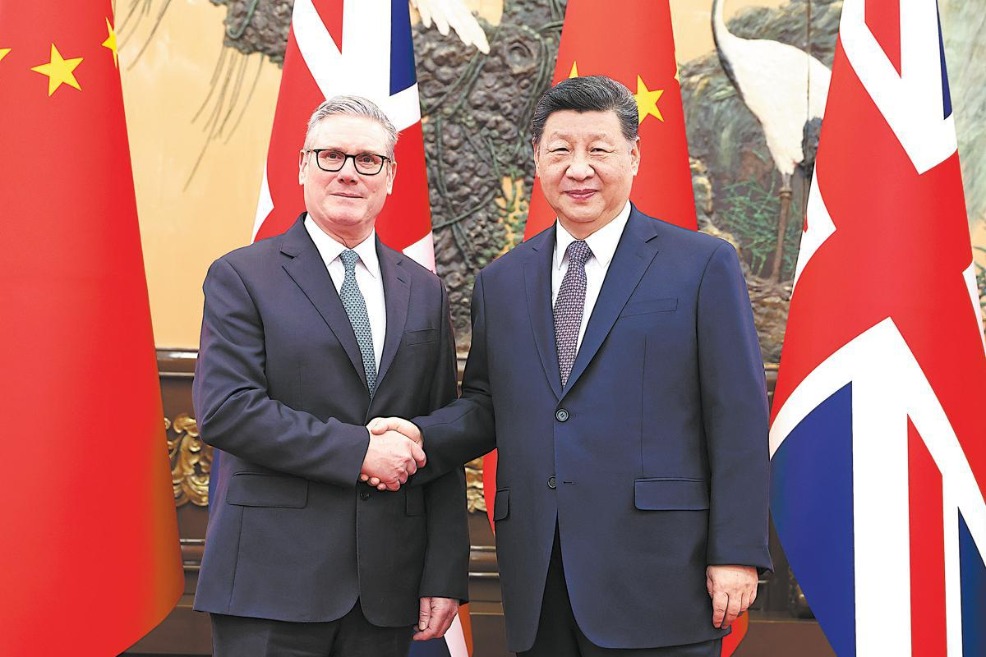Great retail transition underway


China's grocery stores are at a crossroad as the novel coronavirus has hastened a shift in consumers' consumption behavior
The outbreak of the novel coronavirus has irrevocably changed the domestic retail landscape. Nowhere is more pronounced than in grocery stores and markets selling essential foods and other daily-use products. It is no exaggeration to say that China's grocery stores played a pivotal role in keeping the country on its feet, or rather off its feet and safe at home when the virus was raging last year. Amid widespread closure of shops and workplaces, China's grocery ecosystem emerged as a beacon of resilience, their lights and deliveries showing life went on in otherwise silent cities.
Several trends highlight the growth of grocery retail in China, which has been driven by its move online. Online grocery retail is expected to grow significantly after the pandemic, as demand is unlocked in lower-tier cities. In recent years, online grocery retail has been growing at more than 30 percent annually, helping online penetration reach 10 percent of the market in 2019. According to a survey by McKinsey & Co in March 2020, because of the pandemic, the overall frequency of online purchases increased by more than 70 percent, with the shift most pronounced in small cities, where demand from both first-timers and infrequent users has been further unlocked. These cities will continue to be a battleground for fresh grocery e-commerce retailers, all of whom are aggressively expanding their coverage while working to resolve logistics and supply chain issues.
Consumers expect convenience and ultra-fast delivery of fresh food. McKinsey's research shows that four out of five Chinese consumers receive their online fresh food orders a day after placing the order at the latest, while almost half (47 percent) receive them the same day, and 15 percent enjoy delivery within an hour.
Driving this pattern is the sophistication of China's e-commerce infrastructure and the digital adaptability of the Generation Z-those Chinese consumers under the age of 25.According to the McKinsey 2019 Gen Z Asia Survey, 40 percent of Chinese Gen Z respondents rarely visit an offline supermarket, making the number of offline supermarket goers far fewer than older generations in China and their counterparts in other Asian countries. Instead, they source ingredients for home-cooked dinners from online grocery platforms offering ultra-fast delivery, while turning to general e-commerce retailers to stock up on non-perishables. They visit offline convenience stores only for last-minute or impulse buying.
This convenience-seeking behavior has encouraged the opening of neighborhood fresh food marts, which are expected to lift sales by more than 20 percent annually.
The shift to online ordering and consumers' growing preference for healthy and safe products accelerated during the pandemic. Grocery retailers should adapt by investing in online and omnichannel initiatives, particularly those that help reassure consumers about the quality and health benefits of products.
Omnichannel services such as in-store pickup of online orders, QR code scanning of products to reveal more information, and self-check-out have been the most widely adopted digital retail concepts in China.
In-store digitization initiatives including augmented and virtual reality hold great potential, as do smart vending machines and electronic price-tagging, as they are strongly appreciated by shoppers in the limited cases where they have been deployed, according to McKinsey's China digital consumer trends report.
Meanwhile, community group-buying startups have rapidly formed a 29 billion yuan ($4.48 billion) market. Leading players such as Xingsheng Selected leverage social media platforms such as WeChat to offer attractively-priced products, benefiting from efficient community referral models and a scalable supply chain.
Chinese consumers place the highest value on quality, safe ingredients in the fresh and packaged foods they buy, while the pandemic has reinforced the importance of deploying easy methods for tracing food back to its origin. Retailers are meeting this expectation by directly purchasing food from farms, and improving supply chain technologies to reassure customers about the provenance of their products.
There is room for China to catch up with the developed countries in the growth of the organic foods market where it still lags behind in terms of the retail value of packaged organic food as a proportion of total packaged food. The COVID-19 crisis is likely to accelerate consumer appreciation of products they can confidently trace from farm to table.
Traditionally in China, the proportion of private label products is low. However, leading grocery players with strong branding are spearheading an increase in private label penetration. Alibaba Group's Freshippo, for example, is investing ambitiously to reshape the market. In order for the private label market to take off, consumers must perceive private labels as "high quality, value for money "rather than as cut-price alternatives to established brands. Private labels can also help alleviate margin pressure due to intensifying competition.
While the post-pandemic outlook is still uncertain, the public health crisis has set in train a stream of changes in China's grocery market. Consumers increasingly want convenience, whether online or in-store, combined with healthy, fresh and safe products. A battle for the future of the market is already underway, with incumbent offline retailers vying for relevance with the new entrants. Whatever comes next, China's grocery market will continue to develop in dynamic and exciting ways as some of the world's most innovative retail companies compete to deliver daily necessities in the world's second-largest consumer market.
Daniel Zipser is a senior partner at McKinsey & Company, based in Shenzhen. Alex Sawaya is a partner at McKinsey& Company, based in Hong Kong. The authors contributed this article to China Watch, a think tank powered by China Daily. The views do not necessarily reflect those of China Daily.


































